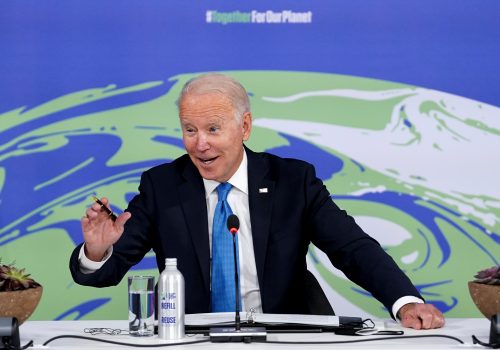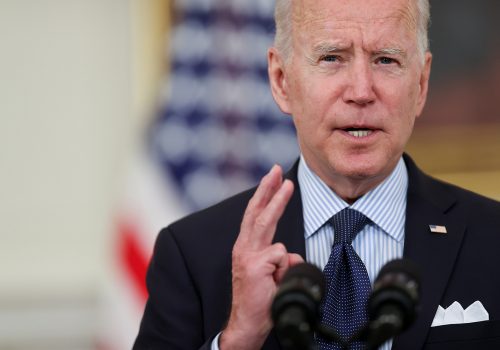December 14, 2021
FAST THINKING: What the US-UAE arms dispute reveals about influence in the Gulf
JUST IN
They’re up in arms. The United Arab Emirates is threatening to scuttle a $23 billion weapons deal with the United States because of a disagreement over US security restrictions intended to guard against Chinese espionage. What does this dispute over US-made F-35 fighter jets and Reaper drones reveal about the relative influence of the United States and China in the Gulf? Can these partners resolve their differences? Our defense insiders swooped in with their insights.
TODAY’S EXPERT REACTION COURTESY OF
- Kirsten Fontenrose: Director of the Scowcroft Middle East Security Initiative and former US National Security Council senior director for the Gulf
- William F. Wechsler (@WillWechsler): Director of the Rafik Hariri Center and Middle East Programs and former US deputy assistant secretary of defense
- R. Clarke Cooper: Nonresident senior fellow with the Middle East Security Initiative and former assistant secretary for political-military affairs at the US State Department
The calculus in Abu Dhabi
- Among the UAE’s strategic aims in raising the prospect of its withdrawal from the arms deal is to force broader “discussions in Washington about the value of the US-UAE relationship,” Kirsten tells us.
- And that reassessment could turn up considerable value—from the Emirati government’s decision to block a suspected Chinese military installation near Abu Dhabi at Washington’s behest to its support for US evacuations from Afghanistan—resulting in the US government taking “a less sanctimonious approach” to its Gulf partner, Kirsten says.
- While Will believes the Emirati announcement is primarily a “negotiating tactic,” he adds that it must be situated in the context of broader worries among the UAE and others in the greater Middle East about the United States no longer playing “its traditional role as the essential guarantor of regional security,” particularly after the “messy” US military withdrawal from Afghanistan. “This perception is the single most important driver” of these actors’ “geopolitical decisions,” he notes.
Subscribe to Fast Thinking email alerts
Sign up to receive rapid insight in your inbox from Atlantic Council experts on global events as they unfold.

Your move, Washington
- With US-UAE defense dialogues set to begin Wednesday in Washington, the withdrawal threat will trigger “an extensive review” of the sale at the Pentagon, Kirsten explains. “The US may not elect to soften its requirements about protections of US technology from Chinese espionage. But it could instead alter technical requirements, bringing the versions offered to the Emiratis closer to the originals flown by the US.”
- There’s an important backstory to this week’s military dialogue. Clarke, who while serving at State helped implement security cooperation through the 2020 Abraham Accords, in which the United Arab Emirates normalized relations with Israel, notes that the pact produced the first-ever US-UAE strategic dialogue last year. That effort, he tells us, was designed to enhance defense coordination between the two countries “to deter military threats through joint planning, training, and exercises, and the interoperability of equipment.”
- Meanwhile, the UAE’s threat to withdraw from the arms deal “mobilizes the American defense industry” just as the 2022 midterm campaigns get underway in the United States, Kirsten says, and defense contractors will back candidates who support these kinds of arms deals.
- The UAE objects to US conditions that would restrict its use of the weapons and impose specific technical requirements. “The UAE is not the only country that complains about such requirements,” Will notes, “and the US would more generally benefit from a rethink of arms-sales policies, which often seem mired in outdated thinking that assumes a US monopoly on certain technologies.”
- But Will cautions that the UAE should not “overplay this argument” because “it is perfectly appropriate for the United States to impose some restrictions.” Rather than hew to a principle that “won’t resonate either in the [Biden] administration or on the Hill,” he says, the UAE should focus its discussions on what exactly those restrictions ought to be.
Rival power play
- Kirsten points out that the UAE’s gambit could also send a friendly message to Tehran. If the Emirati government were to actually cancel its order of jets and drones, it would “signal to Iran that the UAE is not preparing for a [military] confrontation with its neighbor across the Gulf” and that it is “deprioritizing its relationship with the US.”
- That’s not to say that the Emiratis are crossing over to deal with US foes. “The UAE will not buy Russian or Chinese jets,” Kirsten predicts. The Emirati government understands that purchasing military aircraft from these countries would risk inviting US sanctions, she explains, “and that jets made by US adversaries won’t be interoperable with US and NATO forces.” But from Abu Dhabi’s perspective, the threat to back out of an arms sale “is a no-cost means of moving several other issues forward.”
Further reading
Sun, Nov 7, 2021
Special Report: Three lessons from Riyadh and Glasgow, as climate change collides with an energy shock
Inflection Points By Frederick Kempe
The world is experiencing more energy transition than revolution, climate adaptation is critical, and politics will indelibly shape the energy future.
Tue, Jun 15, 2021
The 5×5—The state of cybersecurity in the Middle East
The 5×5 By Simon Handler
How will recent developments in the Middle East affect cybersecurity cooperation, and what does the future of the region’s cyber landscape look like?
Sun, May 9, 2021
Four Mideast signs of change offer historic opportunity. Here’s how Biden can build on them.
Inflection Points By Frederick Kempe
A positive series of loosely connected events across the Middle East offers the best opportunity in memory for reducing tensions, ending conflict, building economic progress, and advancing regional integration.
Image: A Lockheed Martin F-35 aircraft is seen at the ILA Air Show in Berlin, Germany, on April 25, 2018. Photo via REUTERS/Axel Schmidt.


